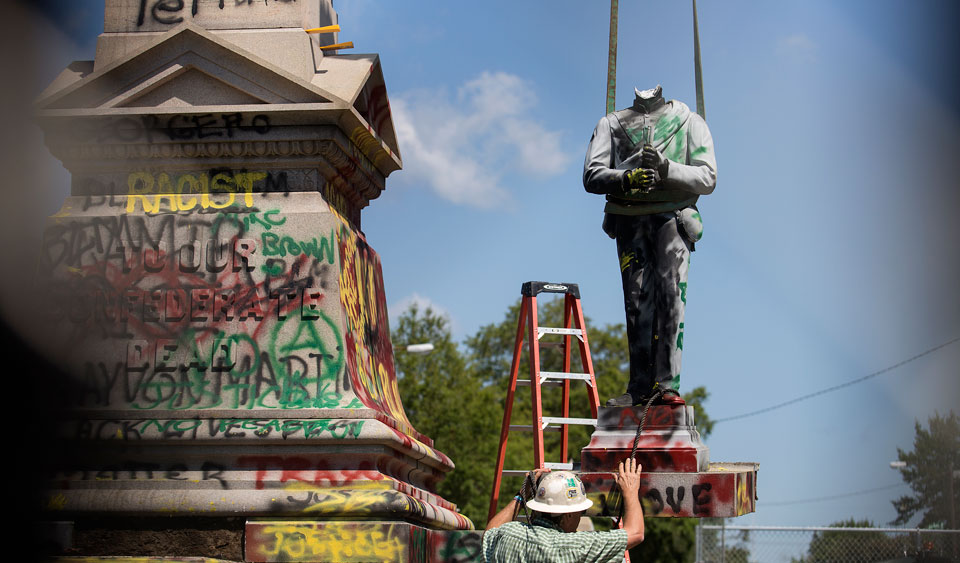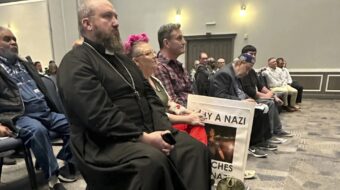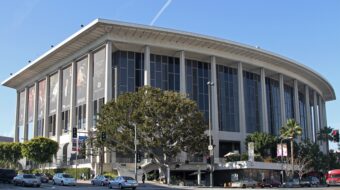
PORTSMOUTH, Va.—Strange things have been going on in the city of Portsmouth, population 95,000, in southeastern Virginia. There is even talk of a “police coup d’état” to remove Black elected officials from office, and thus to thwart efforts at criminal justice reform in the state legislature.
In March, the well-regarded police chief, Toya Chapman, who is Black and who had promised to remedy tense relations between the police and the Black community, abruptly resigned. Shortly thereafter, Chapman stated publicly that her resignation was coerced; that in fact she had been forced out by racist elements in the city leadership and the police force itself.
On June 10, at the height of the national Black Lives Matter protests, demonstrators damaged the city’s Monument to Confederate War Dead, decapitating some figures of Confederate soldiers and spray-painting the structure. Unfortunately, a falling piece of stone seriously injured one of the demonstrators.
The monument’s foundation stone was laid in 1879, with the sponsorship of Ladies Memorial Aid Association of Portsmouth. Local lore has it that it was built on the site of the old slave whipping post, which Union soldiers had cut down when Portsmouth fell to them toward the end of the Civil War. Like similar monuments all over the South, this one was set up to send a message to the Black population that, although slavery had been formally abolished by the 13th Amendment to the U.S. Constitution, the relationship between Black and white would remain separate and unequal forever.
Put another way, monuments like this one were erected to encourage defiance of the law as embodied in the 13th, 14th, and 15th Amendments, passed in the aftermath of the Civil War. Previous efforts to get the City Council to order the removal of the structure had fallen short. But after the thing was damaged on June 10, the council belatedly voted to remove it.
The local Commonwealth Attorney (i.e., state’s attorney), Stephanie Morales, declined to prosecute two leaders of the NAACP, who had been present at the June 10th demonstration.
But then suddenly, on Monday, Aug. 17, the new police chief, Angela Greene, announced that the police were filing felony charges against 14 people as a result of the June 10 events. The charges, of “injuring a monument” and “conspiracy,” were filed with a magistrate by the police themselves, and came as a surprise to Commonwealth Attorney Morales, who would normally be the person to file such charges.
Morales, an elected official, is Black and is considered a reformer. The pretext Police Chief Greene gave for not working through Morales’s office was that Morales “might” be called as a witness in the cases, either by the prosecution or the defense. But evidence that she actually would be called was not given!
In 2015, Morales had successfully prosecuted a Portsmouth police officer for fatally shooting an unarmed Black teenager, so the possibility that simmering police resentment was the reason for doing an end run around the Commonwealth Attorney cannot be discounted.
Heading the list of people against whom felony charges were filed is State Sen. L. Louise Lucas, also Black and a Democrat. She is President Pro Tempore of the Virginia Senate and represents Portsmouth in that body. She is also the leader of the Virginia Legislative Black Caucus. She was due to play a leading role the very next day, Aug. 18, as the Virginia General Assembly took up, in special session, proposals for criminal justice reform. Lucas is specifically charged with urging police not to arrest demonstrators at the monument on June 10.
The measures under consideration include prohibiting chokeholds of the kind that led to the death of George Floyd in Minneapolis, reassigning certain current police functions to social service and psychiatric personnel, creating civilian review boards for police, making it easier to fire abusive police officers, and eliminating “qualified immunity” that makes it so hard for people injured by police to take individual officers to court. In Virginia and elsewhere, such proposals have aroused the fury of a lot of police, and of the political right wing.
Currently, the Democrats have a 21 to 19 majority in the Virginia State Senate. The significance of this was shown by the vote in the Senate the very next week, to approve the creation of a “Commission on Civil Rights and Policing.” The vote was “party line,” with all the Democrats including Lucas voting in favor (except for one who did not vote), and all the Republicans voting against. So the measure squeaked through, 20 to 19. This Commission will have the task of continuing criminal justice reforms in Virginia.
The other people that Police Chief Greene decided to prosecute for “conspiracy” include Portsmouth NAACP President James Boyd and two other NAACP leaders, Louie Gibbs and LaKesha Hicks, School Board member LaKeesha Atkinson, and Kimberly Wimbush, Dana Worthington, and Amira Bethea. Three public defenders were charged with “injury to a monument”: Brenda Spry, Alexandra Stephens, and Meredith Cramer, as were Brandon Woodard, Hanah Renae Rivera, and Raymond J. Brothers. Boyd has been especially critical of police abuses in the past.

In Virginia, persons convicted of a felony lose their rights to vote and hold public office. This is one of the leftover laws from the days of Jim Crow and lynch mobs, and strenuous efforts have been undertaken to get it modified. Sen. Lucas has played a major role in these efforts. If convicted, she would be ousted from the Senate, and the Democratic majority there would be reduced to one vote, 20 to 19 instead of 21 to 19.
Black and Democratic Party leaders have denounced the filing of charges against Lucas especially. Gov. Ralph Northam and former Gov. Terry McAuliffe, both Democrats, have expressed their solidarity with Lucas.
And now other Black elected officials in Portsmouth seem to be targeted. On Aug. 23, a white resident of the city, Tommy Dubois, took out criminal charges against Portsmouth Vice-Mayor Lisa Lucas-Burke, who sits on the City Council and who is also Sen. Lucas’s daughter, for violating a rather strange city ordinance which prohibits City Council members from requesting the hiring or firing of city workers employed by the city manager. At a rally in support of those charged with conspiracy and injuring a monument, Lucas-Burke had called for Police Chief Greene (who is also African American) to either resign or be fired. So now she is formally charged with two misdemeanors, one for what she said at the rally and another for saying something similar in an email.
The punishment, if she is convicted, would only be a $500 fine, but she would be removed from the City Council. Virginia does not have state elections this year, but Portsmouth does have elections for the City Council, and Lucas-Burke is seeking re-election. The Portsmouth City Council currently has four white and three Black members, although the population of the city is 53% Black. The push within the Council for police reform, and for the removal of the Confederate monument has, unsurprisingly, come from the Black members.
So it is not surprising that many see the charges against all these people as a continuation of Virginia’s racist post-Civil War history. Within living memory of many, the governor of Virginia, under the slogan “Massive Resistance,” shut all the public schools in the state to thwart the Supreme Court’s Brown vs. Board of Education ruling mandating racial integration of schools. That shutdown lasted statewide from 1956 to 1959, but until 1964 in Prince Edward County, in South-Central Virginia. And marriage between whites and all non-whites was prohibited in Virginia from colonial times until the famous Loving vs. Virginia Supreme Court case of 1967.
The efforts of racists and reactionaries to turn back the clock to the “good old days” go on and on.

MOST POPULAR TODAY

Zionist organizations leading campaign to stop ceasefire resolutions in D.C. area


High Court essentially bans demonstrations, freedom of assembly in Deep South

Afghanistan’s socialist years: The promising future killed off by U.S. imperialism

Communist Karol Cariola elected president of Chile’s legislature






Comments